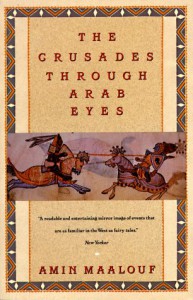Currently reading
The Crusades Through Arab Eyes

A Very Readable Narrative Overview
For those in the West, the Crusades were a series of military expeditions that Western Christians launch against Muslims to reclaim the Holy Land, however for the Arabs and the rest of the Muslim world, the Crusades were a shocking event. “The Crusades through Arab Eyes” is a narrative history by Amin Maalouf to give Westerners a glimpse of how the Muslim world in general saw the Crusades as they were happening over two hundred year span.
Maalouf starts his narrative in Anatolia with the beginning of the First Crusade from the perspective of the Seljuk Turk Kilij Arslan defending his kingdom against his neighbors then against what he believed to be “Franj” troops fighting for the Byzantine Empire. However as the Turk sultan was to learn as well as others, these Franj had different plans. Maalouf’s follows the progress of the First Crusade and the subsequent 200 years through the historical writings of Muslim chroniclers and how the Muslim world reacted throughout that period. The vast majority of the book is the history of the Muslim political and religious currents that interacted and reacted with the Franj, who were themselves divided into permanent residents and military adventurers that came and went.
In the Epilogue besides looking at the long-term effects of the Crusaders on the Middle East, Maalouf highlights something that readers will noticed quickly and what I have already alluded to in this review. While the chroniclers were Arabs, the political and military leadership throughout the Crusader era were Turks or Kurds. During the roughly 200 years that the Crusades took place, the native Arabs watched and experienced the forces of two “foreigners” ruling over them which is a very impactful thought to keep in mind while reading this book.
I first read sections of “The Crusades through Arab Eyes” in 2003 for a Middle East history class. Having now read it in full, I can say that seeing it without the Western romantic veneer or viewpoint brings the period into better focus. While not in-depth as some other books might be, this book gives the reader an easy to follow narrative overview of The Crusades “from the other side”.





 4
4
 2
2
